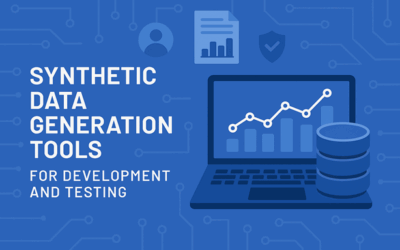
What is Test Data? A Detailed Guide
MAY, 2024
by Andrew Walker.
Author Andrew Walker
Andrew Walker is a software architect with 10+ years of experience. Andrew is passionate about his craft, and he loves using his skills to design enterprise solutions for Enov8, in the areas of IT Environments, Release & Data Management.
Test Data is the lifeblood of testing – it’s what enables us to evaluate the quality of software applications across various industries such as healthcare, insurance, finance, government, and corporate organizations.
However, accessing production databases for testing purposes can be challenging due to the size and sensitive data i.e. personal information contained within. This is where creating a separate set of simulated test data becomes beneficial.
Enov8 Test Data Manager
*aka ‘Data Compliance Suite’
The Data Securitization and Test Data Management platform. DevSecOps your Test Data & Privacy Risks.
In this post, we’ll explore the fundamentals of test data management, including its definition, creation, preparation, and management. By providing you with the essential skills required to become an expert in this important field, we’ll help you ensure that your test data is accurate, reliable, and secure.
A Definition of Test Data
Test data is a set of data used to validate the correctness, completeness, and quality of a software program or system. It is typically used to test the functionality of the program or system before it is released into production. Test data can also be used to compare different versions of a program or system to ensure that changes have not caused any unexpected behavior.
Despite the importance of data in the Software Development Lifecycle and across Software Testing (such as security testing, performance testing, or regression testing), there is surprisingly little discussion on how to handle the data needed for software testing.
This is concerning, as software development and testing rely heavily on well–prepared data cases. Random test cases or arbitrary data cannot be used to effectively test software applications; instead, a representative, realistic, and versatile data set is necessary to identify all application errors with the smallest possible data set.
Ultimately, a small but realistic, valid, and versatile (test) data set is essential.
How do we Create Test Data?
Creating test data is an essential part of software testing, as it allows developers to identify and fix any errors in the code before releasing the product. To ensure that the data set is representative of real–world scenarios, manual creation, data fabrication tools, or retrieval from an existing production environment are all viable options.
Manual creation of test data is the most straightforward method and involves creating sample data that adheres to the structure of an application’s database. This works well for relatively small databases, but is not a viable option when dealing with larger data sets. To properly generate data manually, testers must have a good understanding of the application, its database design, and all business rules associated with it.
Data fabrication tools are another popular way to create test data and can be used to simulate real-world scenarios. These tools allow users to define field types and constraints as parameters in order to create realistic datasets with various distributions and sizes based on their requirements.
Finally, retrieving existing production data is an efficient way of generating test data sets. This method ensures that the data used for testing is accurate and up-to-date, as it has already been validated against the original database schema. A few considerations need to be taken into account when retrieving production environment data; most notably verifying the security of the production environment data by masking or encrypting sensitive information before using it in test environments.
The Challenges of Preparing Test Data
Using or preparing test data can be a challenging task due to several factors. Some of the main challenges include:
- Data access: Test teams may not have access to the necessary data sources required for testing, or developers may take too long to provide testers with access to production data.
- Large data volumes: Large data volumes can make data preparation and provisioning a time-consuming and challenging task. Tip: One potential solution for resolving the volume and provisioning challenge is the use of Data Virtualization or Data Cloning.
- Data dependencies: Applications often have data dependencies, meaning that a change in one piece of data can impact other related data. It can be challenging to ensure that all of the data dependencies are accounted for when preparing test data.
- Data combinations: With many possible combinations of data, it can be difficult to ensure that all possible combinations have been tested.
- Data quality: Data quality issues can impact the validity of test results. It is important to ensure that test data is representative of the data that is present in the production environment and that it accurately reflects the real-world usage of the application.
- Data privacy: Test data often contains sensitive data that must be handled with care to ensure compliance with data security and data privacy regulations.
- Resistance to Change: Another challenge of using or preparing test data is resistance to change. Implementing a new Test Data Management system or process requires a change in the organization’s culture and workflow. Employees may resist change, especially if they have been using the same old manual methods for years. This can lead to a lack of adoption and adherence to new processes, resulting in poor quality testing and increased costs.
Enov8 TDM, Test Data Profiling: Screenshot
Why Use TDM Tools for Test Data?
Overall, preparing test data can be a complex and time-consuming task. However, it is crucial to ensure that test data is representative, accurate, and comprehensive to facilitate effective software testing and ultimately improve software quality.
Test Data Management (TDM) solutions like Enov8 TDM can help organizations overcome some of these challenges by providing a structured approach to test data analysis, preparation, management and ultimately delivering:
- Efficiency: TDM tools automate the process of generating, masking, and managing test data, which saves time and effort compared to manual methods.
- Reusability: TDM tools allow for the creation of reusable test data sets that can be used across multiple testing projects, reducing the need for redundant data preparation.
- Scalability: As the volume of data required for testing grows, TDM tools can help scale the process to meet the demand.
- Consistency: TDM tools ensure that test data is consistent across testing environments, which helps to improve the accuracy and reliability of testing results.
- Compliance: TDM tools can help ensure that test data is compliant with regulatory requirements and industry standards, which is critical for industries such as healthcare and finance.
- Security: Test data often contains sensitive or confidential information such as personally identifiable information (PII), financial data, or intellectual property. Using TDM tools can help organizations ensure that this data is properly protected and masked in non-production environments to avoid data breaches. TDM tools provide security features such as data masking and anonymization, which help to maintain data privacy and security while still allowing testers to have access to realistic and representative test data. By implementing proper security measures through TDM tools, organizations can prevent the unauthorized access or disclosure of sensitive information and reduce the risk of data breaches.
Overall, TDM tools help streamline the test data preparation process, improve test data quality, and reduce risk, which ultimately leads to higher software quality and better business outcomes.
Conclusion
In conclusion, Test Data Management (TDM) tools provide a structured approach to test data preparation and management that helps organizations overcome some of the challenges associated with traditional manual methods.
TDM tools automate time-consuming processes such as generating, masking and managing test data sets which improves efficiency, scalability and accuracy. Additionally, TDM tools can help ensure compliance with regulatory requirements and industry standards while also protecting sensitive information from unauthorized access or disclosure.
Ultimately, using TDM tools can improve software quality and lead to better business outcomes.
Other TDM Reading
Enjoy what you read? Here are a few more TDM articles that you might find interesting.
Enov8 Blog: A DevOps Approach to Test Data Management
Enov8 Blog: Types of Test Data you should use for your Software Tests?
Enov8 Blog: Why TDM is so Important!
Relevant Articles
7 Synthetic Data Generation Tools for Dev & Testing
In software development and testing, having access to high-quality, realistic data is crucial. But real production data is often sensitive, regulated, or simply unavailable for testing purposes. Synthetic data generation tools provide a powerful alternative, enabling...
The SAFe Hierarchy and Levels, Explained in Depth
The Scaled Agile Framework (SAFe) is a comprehensive set of principles and practices designed to help organizations adopt agile methods on an enterprise level. It provides a set of guidelines and best practices that enable large-scale product development with agility....
DORA Compliance – Why Data Resilience is the New Digital Battlefield
How Enov8 Helps Financial Institutions Align with the EU's Digital Operational Resilience Act Executive Introduction As of January 2025, the EU's Digital Operational Resilience Act (DORA) has become legally binding for financial institutions operating across the...
Data Fabric vs Data Mesh: Understanding the Differences
When evaluating modern data architecture strategies, two terms often come up: data fabric and data mesh. Both promise to help enterprises manage complex data environments more effectively, but they approach the problem in fundamentally different ways. So what’s...
What Is Release Management in ITIL? Guide and Best Practices
Managing enterprise software production at scale is no easy task. This is especially true in today’s complex and distributed environment where teams are spread out across multiple geographical areas. To maintain control over so many moving parts, IT leaders need to...
Test Environment: What It Is and Why You Need It
Software development is a complex process that requires meticulous attention to detail to ensure that the final product is reliable and of high quality. One of the most critical aspects of this process is testing, and having a dedicated test environment is essential...












